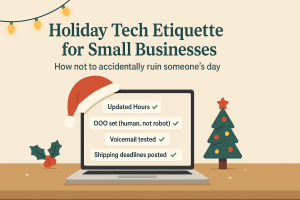January 9, 2025
Cyber-threats in 2024: Why Small Businesses Are the New Target
In 2024, cyber-threats are no longer just a concern for big businesses. Surprisingly, large corporations are not the primary targets for most cybercriminals. Instead, small and medium-sized businesses (SMBs) face increasing risks. With the average cost of a data breach exceeding $4 million (IBM), a single incident could devastate a smaller business.
This is where cyber insurance steps in—not just as a financial cushion but as a tool to help your business recover quickly and continue operating after an attack.
Let's explore what cyber insurance is, why you might need it, and how to qualify for coverage.
What Is Cyber Insurance?
Cyber insurance helps cover the costs of responding to cyber incidents, such as data breaches or ransomware attacks. For SMBs, it can be a lifeline, helping to manage expenses like:
- Notification Costs: Informing customers about data breaches.
- Data Recovery: Covering IT support for restoring lost or compromised systems.
- Legal Fees: Handling lawsuits or compliance penalties.
- Business Interruption: Replacing lost income due to temporary shutdowns.
- Reputation Management: Assisting with public relations after an attack.
- Credit Monitoring Services: Protecting affected customers.
- Ransom Payments: Depending on the policy, covering ransomware payouts.
Policies are typically divided into:
- First-Party Coverage: Protecting your company's assets (e.g., system recovery, response costs).
- Third-Party Coverage: Covering claims from customers, partners, or vendors impacted by an incident.
Think of cyber insurance as your safety net for when digital risks become real-world challenges.
Do You Really Need Cyber Insurance?
Is cyber insurance legally required? No. But as cyber incidents grow more costly and frequent, it's becoming essential for businesses of all sizes.
Specific Risks for Small Businesses
- Phishing Scams: Employees are often tricked into revealing passwords or sensitive information. Many SMBs fail phishing tests during assessments, exposing significant vulnerabilities.
- Ransomware Attacks: Hackers lock systems and demand payment to unlock them. Paying the ransom doesn't guarantee data recovery, and dealing with the aftermath can cripple a business.
- Regulatory Fines: Mishandling customer data can lead to steep penalties, especially in regulated sectors like finance or healthcare.
While robust cybersecurity practices are critical, cyber insurance provides the financial fallback SMBs need.
Requirements for Cyber Insurance
To qualify for cyber insurance, insurers will assess your commitment to cybersecurity. Here's what they expect:
1. Security Baseline Requirements
- Firewalls, antivirus software, and multifactor authentication (MFA) must be in place.
- Without these foundational tools, insurers may deny coverage.
2. Employee Cybersecurity Training
- Human error is a leading cause of breaches.
- Insurers often require proof of employee training to minimize risks.
3. Incident Response and Data Recovery Plans
- A documented plan for handling breaches shows preparedness.
- Insurers favor businesses with clear steps for containment, notification, and recovery.
4. Routine Security Audits
- Regular vulnerability assessments ensure ongoing protection.
- Annual audits are often a requirement.
5. Identity Access Management (IAM) Tools
- Role-based access controls and monitoring are critical.
- Insurers check for strict authentication processes, such as MFA.
6. Documented Cybersecurity Policies
- Formal policies around data protection, password management, and access control demonstrate a culture of security.
Insurers may also assess data backups, encryption practices, and data classification measures as part of their evaluation.
Protect Your Business With Confidence
The question isn't if your business will face cyber-threats—it's when. Cyber insurance is a vital safeguard to protect your business financially when those risks materialize.
Whether you're renewing a policy or applying for the first time, meeting these requirements will position you for the best coverage.
Get a FREE Security Risk Assessment Today
Have questions or need help preparing for cyber insurance? Contact our team for a FREE Security Risk Assessment. We'll review your current cybersecurity setup, identify gaps, and help you protect your business.
📞 Call us at 866-766-1313 or click here to book your assessment now!



